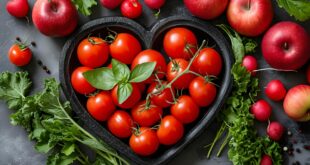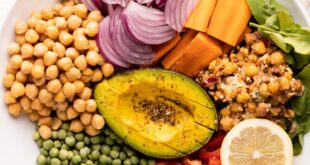Maybe it’s the fact that I’ve been watching episodes of Chopped incessantly on Netflix, or the fact that my vegetable-hating husband wants me to transform his diet into one that’s healthy, but I can’t help but draw a correlation between our physical diets and our spiritual health.
Just like an abundance of fried and processed foods—counterfeits of the “real thing”—never satisfy, filling our hearts and minds with just the “highs” of Christianity can’t substitute an authentic relationship with Christ.
Don’t get me wrong: the “highs” (or shall we call them “sweets”) of Christianity have their place, just like desserts have their place in the Food Pyramid. But they won’t sustain you. Take a look:
Whole Grains
A diet packed with whole wheat, corn, rice, oats, barley and other nutritious grains ensure proper digestion. Whole grains are soaked in antioxidants, vitamins and minerals that help our bodies fight. Not to mention, they help reduce mortality rates. According to researchers at the University of Minnesota School of Public Health, as whole-grain intake went up, total mortality went down.
Therefore, is it any wonder why Jesus taught us to pray saying, “Give us today our daily bread” (Matthew 6:11)? To digest the truths of Scripture, to prevent the onset of spiritual heart disease, we need our daily intake of bread. As our bodies require an abundance of whole grains, our souls require daily interaction with Jesus.
Yes, “bread” in this scriptural context can mean the necessities of life, but as Rick Warren points out, the Bible is spiritual food and bread a symbol for Scripture. Deuteronomy 8:3 says, “. . . man does not live on bread alone but on every word that comes from the mouth of the Lord.” Abundant living comes from nourishing our spirits with the Word of God.[1] It’s the “sword of the Spirit,” which helps us combat the enemy, and continued use of it helps us to “break down,” or digest, the spiritual significance of Scripture.
Protein & Dairy
Whether you’re a meat-loving connoisseur or a vegetarian who noshes on lentils and pine nuts, your body needs protein. This organic compound is responsible for building up the structural components of your body, essentially acting as a building block for bones, muscles, cartilage, skin and even your blood. It energizes and repairs the body, too.
Protein does for our bodies what church does for our spiritual growth. While protein helps repair our damaged tissue at the end of a long workout, fellowship strengthens our walk with Christ after a long and battle-filled week. Hebrews 10:24–25 says, “And let us consider how we may spur one another on toward love and good deeds, not giving up meeting together, as some are in the habit of doing, but encouraging one another—and all the more as you see the Day approaching” (emphasis mine). And just as protein enhances the structural component of the body, fellowship enhances the structural components of the Body of Christ—that is, the church. If you do not attend, the church is missing an intricate part of the Body.
1 Corinthians 12:27 says, “Now you are the body of Christ, and each of one of you is a part of it.” Get your fill of protein. Not only will fellowship with like-minded individuals repair your soul as protein repairs tissue, but collective worship and teaching will strengthen the overall structure of your walk with Christ.
Fruits & Veggies
All those colorful fruits and leafy greens work together to help reduce your risk for heart disease and cancers. Prayer, which involves ongoing surrender of self, helps prevent spiritual heart disease. For instance, Philippians 4:6 reminds us to pray with thanksgiving. The truth is, a thankful heart and a bitter heart cannot coexist in the same body. Therefore, prayer, when coupled with thanksgiving, prevents those roots of bitterness from taking root and strangling our faith and trust in Christ.
Remember, the heart is deceitful (Jeremiah 17:9), and therefore it is in our best interest to follow the call in Thessalonians 5:17 to “pray without ceasing.” Not only does it prevent spiritual heart disease, but it also draws us closer to our Savior in an intimate and magnificent way.
Sweets
Sweets: the cherry on top, the dollop of whipped cream, the decadent frosting . . . what’s not to love? While my sweet tooth often convinces me that sugar is all I need, my body often reminds me (after a late-night ice cream binge), that while sweets are intensely satisfying, I can’t live off them.
I relate physical sweets to the “spiritual high” we often get at conferences, retreats, youth camps and missions trips. Those events, which are not meant to be understated, should be sprinkled on top of our daily devotions, prayers, and Sunday gatherings. Conferences, for instance, have the ability to get us back on the right spiritual track. Youth camp amps us up for the next big movement of God. Missions trips help us see people through Christ’s eyes, and retreats can deepen our faith. These events aren’t to be taken lightly. But just like a sugar rush, folks often come back from a retreat on a “high” and later sense the excitement dwindle.
You can’t live off the “spiritual highs.” But you can harness them and use them to deepen your faith by enhancing it with a balanced spiritual diet of grains, protein, fruits and veggies.
So there you have it: a correlation (and there are several) between your physical and spiritual health. Which food groups have you mastered and which ones may require a bit more willpower?
Sources for dietary information: WebMD.com
[1] http://rickwarren.org/devotional/english/your-daily-bread
 The Bottom Line, Ministries Christian News, Articles, & Poetry
The Bottom Line, Ministries Christian News, Articles, & Poetry 




